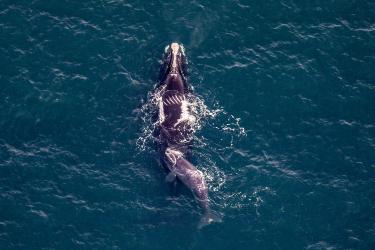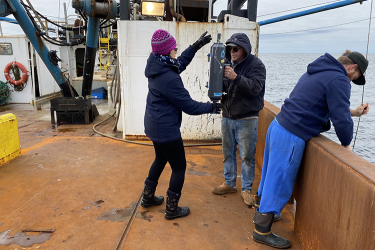My name is Andrew D’Agostine and I grew up in the North End of Boston, Massachusetts, near the harbor and the New England Aquarium. I volunteered at the aquarium throughout high school and began my lifelong love of the sea and an interest in marine biology. I graduated from Washington University in St. Louis, Missouri. I earned a bachelor’s degree in Earth and planetary sciences and film and media studies, concentrating on biogeochemistry and broadcast media. After graduating, I served with AmeriCorps Community HealthCorps and pursued other career interests. I entered the Northeast Fisheries Observer Program as an at-sea monitor in 2016, with a homeport in New Bedford, Massachusetts. I had not heard of the observer program before. After learning about the unique position, I was excited for the opportunity to combine my interests in fishing, science, and the ocean.
After observing groundfish for a season, I became a certified industry-funded scallop observer the following spring. By then, I began to settle into a routine and to become comfortable with my duties on these commercial fishing vessels. The majority of my trips were multiday groundfish trawls and would generally include four to six hauls of catch per day. Depending on the composition of the catch, it would take me around 1 to 3 hours to sample each haul. I would sort and weigh fish, determine reasons for discarded and kept catch, and take subsamples for length frequency measurements. After a haul, I’d immediately head below deck to down a can of soda (I prefer Diet Coke). Then I’d transcribe my data to an observer-issued tablet and paper logs.
Once my work was completed, I’d often retreat to my bunk with a good book. Or, I’d allow the periodic rocking of the vessel to be a soothing meditation as I awaited the next haul to be sampled.* I generally listen to audiobooks, and would strongly recommend getting into some classic sci-fi series, such as Isaac Asimov’s Foundation or Scott Card’s Ender’s Game Series. On my very first trip as an observer, I brought my favorite stories as company: a hard-copy version of Paulo Coelho’s The Alchemist, and the unabridged audiobook of Philip Pullman’s His Dark Materials.
One of the things I enjoyed most about observing is the variety of creatures, vessels, and people I’ve encountered. The smell of the sea air and the feeling of being so many miles offshore are hard to describe, and feelings I will always cherish. My favorite memory was when the observer program informed me that I had submitted the first verified sighting of a Verany’s long-armed squid in the Northeast. I have always had a soft spot for cephalopods, so the fact that this was verified as a “first ever” squid species made the honor even greater.
I continued to observe for two years. I had the opportunity to eat some amazing food at sea and meet lots of different fishermen from various backgrounds. I love seafood and was frequently impressed and happily surprised when crew members whipped up restaurant-quality seafood dishes!
In 2018, I accepted a position with AIS, Inc. as an observer coordinator. Since then, I have been an area coordinator for at-sea monitoring and Northeast Fisheries Observer Program observers. I’ve also spent time as the lead sea scallop coordinator. I’m currently the Northern New England Area Coordinator, servicing ports from Boston to the Canada border. I remain thankful that I am able to continue working with the observer program, which continues to provide meaningful experiences and unforgettable memories.
*Fishing, like other jobs and careers, can have periods of downtime. Observers often fill it with data responsibilities, talking and connecting with the captain and crew, or other observer-related activities. But sometimes, to break things up, observers will read or watch media while gear is fishing, the vessel steams between fishing spots, or the vessel and gear undergo maintenance.
The COVID-19 emergency resulted in disruptions in NOAA Fisheries’ observer programs, but we remain able to place observers throughout the country. While it did take Northeast observers off the water, that should change in July.




